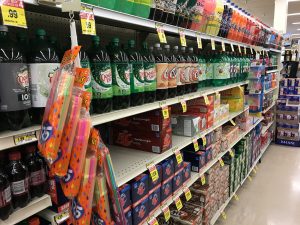As soda tax goes flat, Preckwinkle looks to chart a new course
By Kevin Beese Staff reporter — October 16, 2017
Cook Commissioners voted last week to repeal the Sweetened Beverage Tax as of December. (Chronicle Media photo)
In the end, Cook County commissioners put their political health above the revenue generator promoted as a way to boost constituents’ health.
The short-lived county sweetened beverage tax appeared to be the last straw with a tax-weary public, according to Chris Lentino, manager of Chicago outreach for the Illinois Policy Institute, an independent organization generating public policy solutions aimed at promoting personal freedom and prosperity in the state.
Commissioners voted last week to repeal the tax as of December.
“For months, commissioners have been subjected to relentless criticism from taxpayers who overwhelmingly disapprove of the so-called ‘soda’ tax,” Lentino said in an email. “It appears that this tax was the tipping point for residents who have had to shoulder one of the highest tax burdens in the country.
“From some of the nation’s highest wireless taxes to taxes on streaming services such as Netflix and Spotify – not to mention a record-breaking property tax increase (in Chicago) and the highest sales tax of any major city in the nation – residents of Chicago and Cook County at large are tapped out. They have made their voice heard.”
Chicago Cubs manager Joe Maddon even piled on in a post-game press conference, comparing his disdain for the Buster Posey Rule where a catcher must provide a lane to home plate for a base runner — which was the subject of a video review and cost the Cubs a run in their Game 1 loss to the Dodgers — to the unpopular soda tax.
“That was a beautifully done major league play all the way around,” Maddon said of Saturday’s play where outfielder Kyle Schwarber threw a strike to catcher Wilson Contreras to apparently gun down a Dodgers base runner. “That gets interpreted kind of like tantamount to the soda tax in Chicago for me.”
The one-cent-per-ounce tax on sweetened beverages in the county was viewed as a way to help plug a budget shortfall and improve the health of residents.
Cook County Board President Toni Preckwinkle, who broke an 8-8 tie to pass the tax last summer, was disappointed in the repeal but said she respects commissioners’ right to rescind the tax. Now, she said, county leaders need to find additional revenue to fund county operations.
“It is up to the commissioners to choose our direction on revenue, and I respect their authority to do so,” Preckwinkle said in a statement. “Now, together, we must chart a new course toward the eighth consecutive balanced budget in my tenure as board president.”
She said while unhappy with the repeal, she was happy with the effort made by health professionals to support the tax for the benefit of county residents, especially in vulnerable communities.
“As I noted last month, the difficult fight for this revenue has focused me on what matters most: Doing the hard work necessary to build a healthier, safer and more efficient Cook County,” Preckwinkle said. “That work continues.”
Residents had expressed outrage over the county tax, which, coupled with Chicago’s 3 percent soft drink tax and the city’s 10.25 percent overall sales tax rate, tacked $1 onto the $2.49 base price of a 2-liter of soda in the city limits.
Commissioners opted to repeal the tax last week by a 15-2 vote. Only Commissioners Jerry Butler (3rd District) and Larry Suffredin (13th District) voted against repealing the tax.
“I voted to keep the Sweetened Beverage Tax because it was a tax on a small number of people rather than a general sales tax or property tax on all,” Suffredin said in a statement. “This tax had a twofold purpose. First, it provided enough revenue to balance our 2017 budget without gimmicks; and secondly, it helped us fight the increase in heart disease, diabetes, obesity and osteoporosis, and the high cost of treatment.
“In addition, and unfortunately, the repeal of the Sweetened Beverage Tax also repeals the law that prohibited the raising of any taxes by the county until after 2020. This tax limitation covered property taxes, sales tax and home-rule excise taxes. The repeal of the tax limitation means all taxes are in play.”
Some commissioners had received push-back from constituents over the tax with some residents refusing to sign campaign petitions to get their respective commissioner on the ballot for the 2018 primary.
Illinois House Republican Leader Jim Durkin (R-Western Springs) called the beverage tax “massively regressive and poorly implemented.”
“The passage of the tax was originally billed as an effort to improve public health, but Cook County residents saw through this ruse despite millions of dollars spent trying to convince them otherwise,” Durkin said in a statement.
He said if the County Board had failed to act, the House Republican Caucus was ready to push legislation that would have prohibited a home-rule county from imposing a tax on sweetened beverages based on volume sold.
Read the current issue of the Cook County Chronicle
Free subscription to the digital edition of the Cook County Chronicle
—- As soda tax goes flat, Preckwinkle says ‘We must chart a new course’ —-







